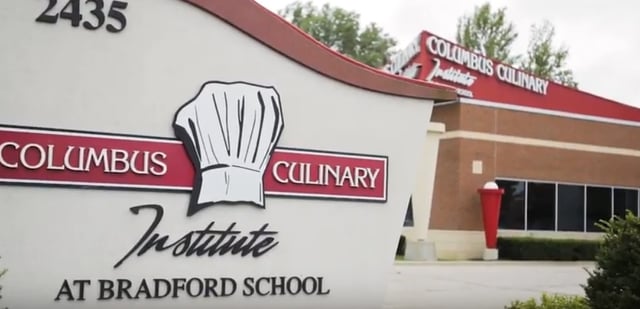
For the past 11 years, the Columbus Culinary Institute at Bradford School in Columbus, Ohio has contributed to excellence in the hospitality industry by preparing close to 1,300 students for rewarding careers in restaurants around the country. Dan Reese, Director of Operations, said the institute is training people to create a memorable dining experience, “That doesn’t start in the dining room with the maitre de or the servers – it starts with the chef and works its way out into the dining room.”
Reese said students can come in the door with little to no experience and by the time they graduate with an Associate of Applied Science degree or a diploma in culinary arts, they are ready to enter the industry and move up quickly. “We are raising the bar on entry-level positions – so that people are better prepared when they come in the door,” he said.
Reese said the way students learn is changing, “It’s no longer ‘sage on the stage’ where the instructor shows up and the students all listen.” Now, Reese said, the knowledge students receive must be directly applicable to their work and easily accessible, which can make teaching a challenge.
Koorsen is helping the institute meet that challenge. For the last ten years, Koorsen has been providing hood system cleaning for the institute as well as regular maintenance and inspections of the kitchen fire suppression system. As part of its shared commitment to safety education, Koorsen has also been providing expert training to students and faculty, significantly enhancing the value of the cleaning, maintenance, and inspection services it offers the institute.
Every year, Tonya Hardgrove, Koorsen’s Corporate Restaurant Business Manager, comes to the institute to do a walk-through in the kitchen with students to give them a better understanding of the hood systems that extract the heat, grease and other vapors generated in the kitchen to keep it running safely and efficiently.
She also helps them learn more about the Ansul fire suppression systems that are critical to safety in a commercial kitchen. For example, she teaches them about grease fires and the importance of having caps on the Ansul systems to keep grease, dirt and grime from building up and clogging the nozzles, which can prevent them from functioning properly in the event of a fire.
Reese said Hardgrove explains to the students what a hood cleaning entails and what they should expect if they come in the day after a cleaning. He said, “We all know what a bad hood cleaning looks like. The kitchen manager comes in in the morning and sees greasy dark coffee-colored water on the floor, splash on plates that didn’t get covered, liquid running down the inside of the hood and possibly baffles that didn’t get clean.”
Reese emphasized that hood system cleaning is not only a cosmetic issue, “In a restaurant setting, cleanliness has a direct impact on the health and safety of the food being served.” Reese said the training Koorsen provides with its hood cleaning and maintenance service is especially valuable to the institute and its students because equipment maintenance and safety is an important part of the curriculum.
Hardgrove teaches by example. Koorsen’s services help to set the bar for students on what they should expect when they graduate and begin working in a real commercial kitchen. Reese said the institute has five kitchens, each of which are cleaned twice a year and that cleanings usually take 1-2 days.
He said Hardgrove explains to students what they can and should expect when they come in the morning after a Koorsen cleaning – that their kitchen “is going to be cleaner than when they left it because the hoods are going to be clean, shiny and bright with no contaminants where there shouldn’t be any.”
The instruction that Hardgrove provides the students and faculty isn’t a part of Koorsen’s contract for services with the Columbus Culinary Institute. It is born of the close partnership Koorsen develops with its clients.
Reese said he’s been very happy with the institute’s partnership with Koorsen. He not only appreciates the training Koorsen provides but also the company’s proactive customer service. Reese noted that recently, the institute had to complete an in-depth check of its suppression system – a significant and costly part of the scheduled maintenance that’s required every 12 years. Reese said he hadn’t been aware of this requirement. “Luckily,” he said, “Koorsen let me know a year ago. So I was able to budget for it. That was a huge bonus because we all want to be able to budget. We don’t want surprises.”
Reese said that as a director, though, his biggest concern is his students – making sure they’re getting the education they need to build a rewarding career in the hospitality industry. “The product is students,” he said, "Are our students getting every ounce of knowledge we can offer?” With the value-added services Koorsen provides – maintenance services combined with training to augment the excellent instruction the Culinary Institute provides – Reese can be pretty confident they are.
Contact Koorsen Fire & Security today to learn more about the benefits of partnering with Koorsen for all your fire suppression and commercial kitchen needs.

